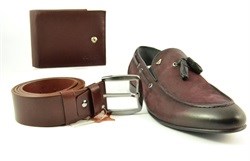
The Turkish company will launch a showroom that showcases its local productions in South Africa. By basing its operations in South Africa, Calvano hopes to stimulate the local leather industry, which currently survives on exports.
Calvano means 'before the existence' and the brand is no stranger to the South African consumer. The company, reputed for handcrafting 15 pairs of each style globally to maintain exclusivity and uniqueness for the individual, previously supplied high-end stores such as Socrati from its Turkish base.
"We are exploring opportunities with the South African government to fulfil our promise of creating jobs and developing the youth through the production of quality leather shoes," says Suleyman Yagci, Executive Manager at Calvano.
"Each shoe is a meticulously crafted piece of art and caters to both men and women. We have been in operation in South Africa for over two years and consumers want to see more of our brand. Our men's range is a firm favourite on the red carpet and some of our future plans include securing the right celebrity brand ambassador to showcase the craftsmanship."
Mphaho is the founder of Vision 2015, an NGO established in early 2000 to bridge the digital divide and the imbalance in the South African education system. While many fashion manufacturers keep their operations offshore, Mphaho says, "I saw an opportunity to participate in the shoe manufacturing sector because of the National Development Plan's (NDP) call on South African entrepreneurs to assist with job creation, as well as the solid international trade relations the country has with Turkey".
To support the local industry, Calvano has committed to securing permanent employment for a number of South Africans, as well as training dozens more within its operation.
Mphaho highlights one of the challenges faced by local production that many local abattoirs have signed long-term exclusivity deals to export skin. His aim is to change that by negotiating for a portion of the supply to remain on South African shores - minimising the export of raw materials, improving the skill of hand crafting leather shoes in South Africa, involving young local designers in the production process and ultimately stimulating the South African economy.
"With South Africa seeing a sharp increase in skills shortage, particularly amongst the youth, fashion is likely to encourage them to exchange the streets for a workshop that will be the training ground for those employees to become specialist craftsmen and women," concludes Mphaho.
For more information, go to www.mrcalvano.com.